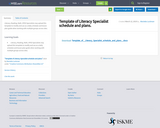
Literacy, Reading, Math, SPED Specialists may upload this template to modify and use as a daily schedule and lesson plan guide when working with multiple groups across sites.

Literacy, Reading, Math, SPED Specialists may upload this template to modify and use as a daily schedule and lesson plan guide when working with multiple groups across sites.
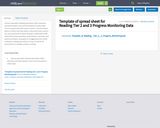
Literacy Specialists, Reading Specialists, SPED, Educators and administrators may use this template to collect data. This is a spread sheet that may be used K-8. This tool allows teams to collect and share data in a document that is easy to use, pull up and look at when working in collaboration with teams that include specialists, administrators, educators and parents working to close gaps for struggling learners. While created for reading interventions it may be used for all interventions in multiple academic settings.
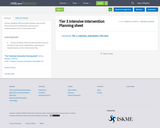
Literacy, Reading, SPED and administrators may use this form to document collaboration, planning and implementation of Tier 3 Intervention Plan.
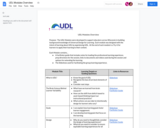
The UDL Modules were developed to support educators across Wisconsin in building background knowledge of Universal Design for Learning. Each module was designed with the intent of learning about UDL by experiencing UDL. At the end of each module is a Try-it for learners to apply their learning to their context.

USDLAC is a consortium of professional educators, teachers,international institutions which offer assistance in Distance Learning and Online Programs along with helping out in matters like attestation, admissions and career counseling.

This presentation was delivered at the December 12, 2023 Virtual Networking for School Librarians session.
It provides background on the purpose and creation of the toolkit, an overview of the Activity Guide and unpacks one learner scenario. All links to the corresponding AASL resources are included. These resources are available to all.
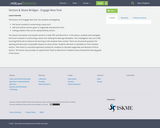
This lesson, from Engage New York, has students investigating:the forces involved in constructing a stone archadd and subtract vectors given in magnitude and direction formsolving problems that can be represented by vectorsThis lesson has teacher and studnet versions in both PDF and Word form. In this lesson, students will investigate the forces involved in constructing a stone arch utilizing the web app GeoGebra. This investigation also use a PBS Learning/NOVA site to enhance the learning so the students have context. There are structured questions for opening and discussion of possible impacts on stone arches. Students will work on GeoGebra to find resultant vectors. Then there is a structed exploratory activity for students to calculate magnitude and direction of force vectors. This lesson also provides an optional Exit Ticket to determine if students have achieved the learning goals of the lesson.

This 2014 thesis aims to explore how video games have become an extremely beneficial tool in regards to education, art, medicine, psychology, economics, and beyond. Chapter 1 focuses on how ubiquitous video games have become in America, and what makes video games such a uniquely enjoyable experience to warrant such popularity. Chapter 2 explores how video games have become instrumental in various fields. Chapter 3 discusses the role that video games now play in the world of education; specifically how we, as educators, must adapt a modern pedagogy best suited to students who have grown up with video games, which have influenced how they learn. This is the thesis’ primary contention and purpose. Chapter 4 dissects the two most studied controversies which surround video games as a medium: video game violence and video game addiction.
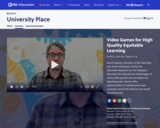
04/14/21 | 59m 20s | Rating: TV-G
David Gagnon, Director of the Field Day Lab at the Wisconsin Center for Education Research at UW-Madison, discusses the educational advantages of using video games and simulators as teaching tools. Games offer opportunities to actively learn new concepts and to fail without real world consequences.

Presenters:
Chris Baker (Public Library Consultant / Games & Learning Consultant, Library Services Team of the Wisconsin Dept. of Public Instruction), Jenna Gilles (Youth Services Associate, Chippewa Falls Public Library), & Jamie Hein (Library Director, Clintonville Public Library)
Description:
For years now, media usage data has shown that video games have led the entertainment industry by a massive margin, handily securing the crown as the most popular recreational medium on the planet. In the United States, 61% of Americans report playing video games for at least one hour every week; 29% of game players are 50 or older, and the average age of video gamers in the U.S. is 36, with a near-even split of 53% identifying as male, and 46% identifying as female.
The point? These impressive statistics represent an enormous opportunity for libraries in the U.S. to capitalize on – and illustrate that librarians ought to prioritize intentionally developing robust video game collections for their users to access; game collections can meaningfully help libraries reach a broader base of patrons, create exceptional new pathways for materials circulation, resonate with additional user identities, and help foster a 'community of practice' surrounding games in the library space. On top of this, video game collections help libraries showcase an earnest desire to remain relevant, accessible, and cutting-edge to their public.
In this first presentation in our series about video game collection development, you’ll hear from multiple librarians about the “why”, “what”, and “how” of video game selection and acquisition; we will highlight both philosophical and pragmatic best practices for developing video game collections – from advocacy data, to funding tips, to selection resources, to acquisition schedules, and more. A follow-up webinar in the series will focus on things like processing, borrowing rules, policy, and collection maintenance. You won’t want to miss these presentations!
Webinar date and time: October 30, 2024 11:00 AM EDT
This event was co-sponsored ALA's Games & Gaming Round Table: http://www.ala.org/rt/gamert